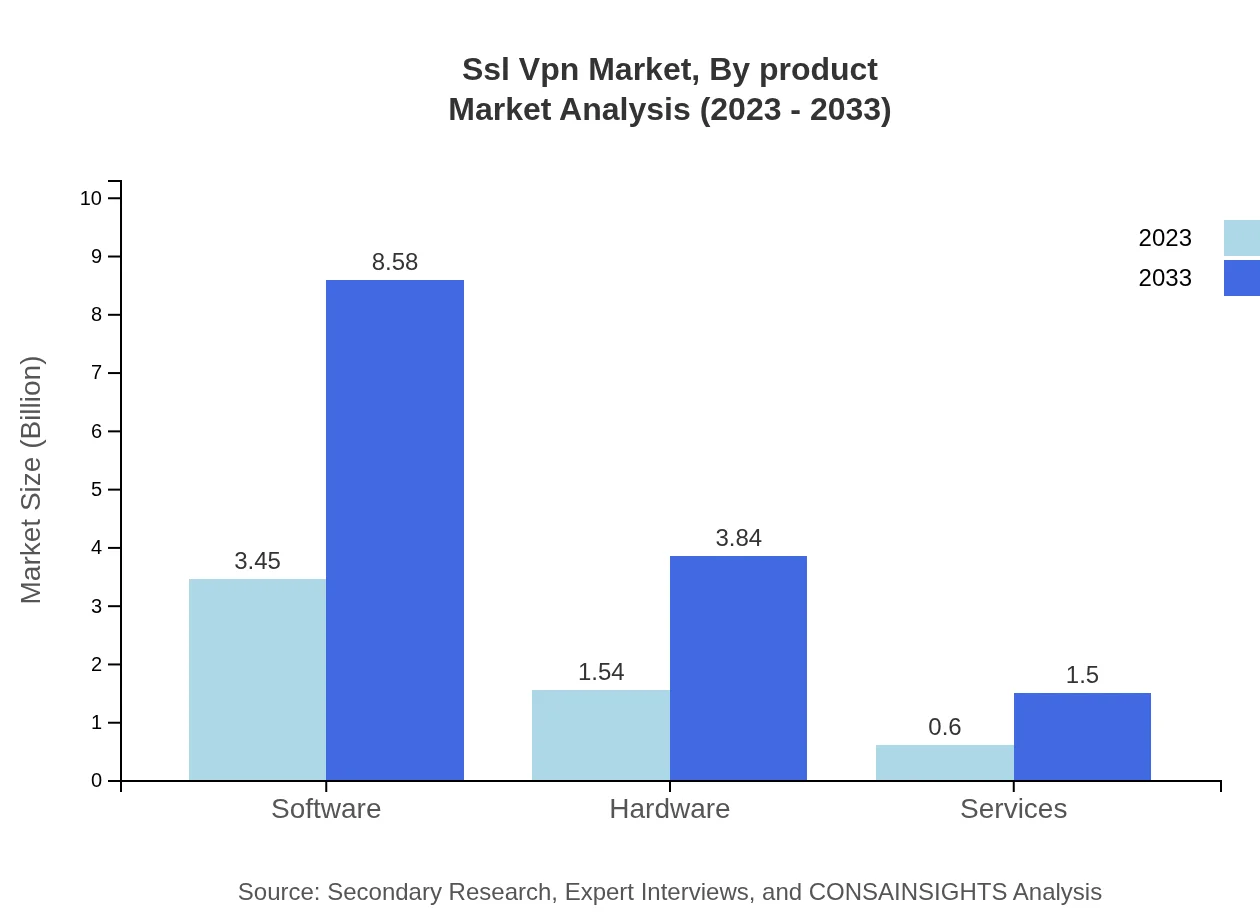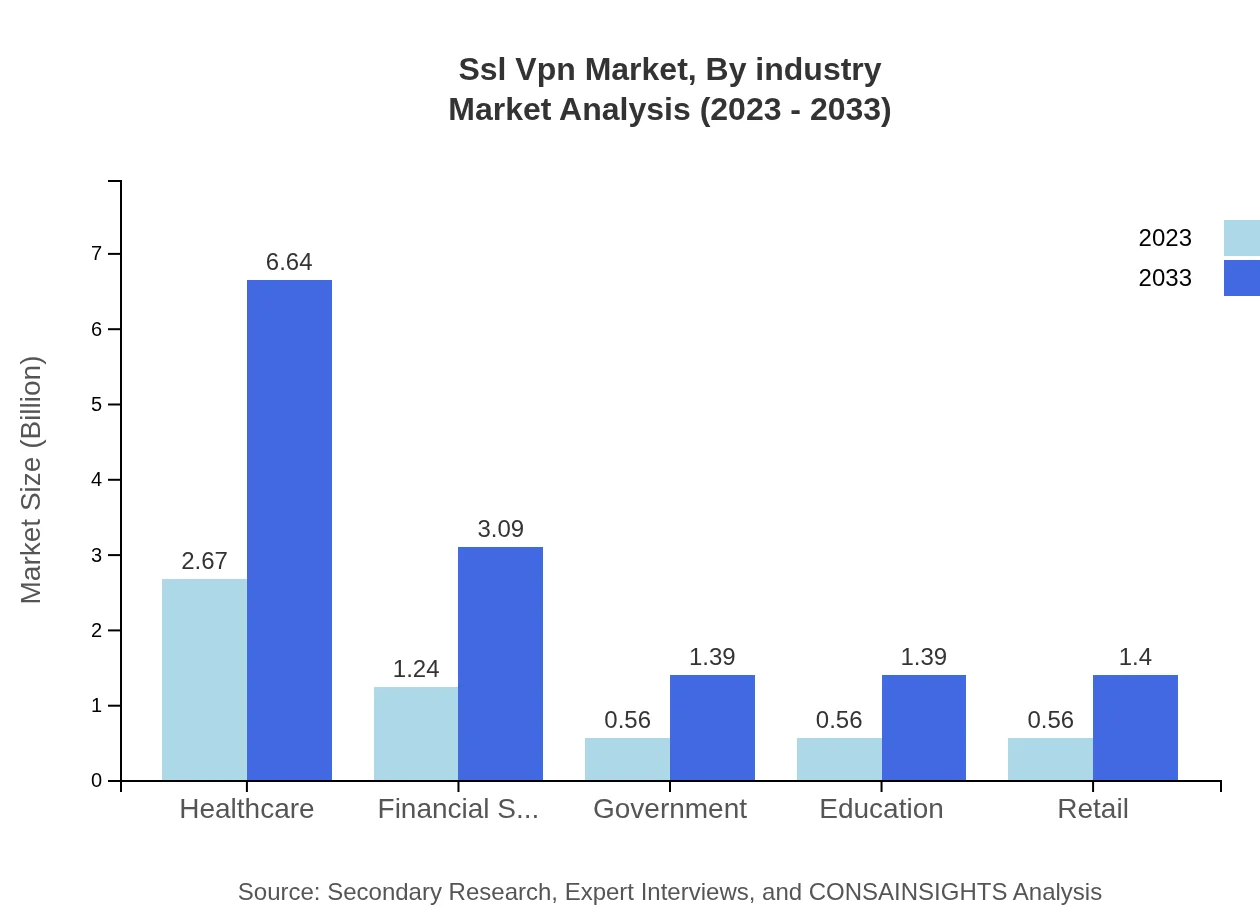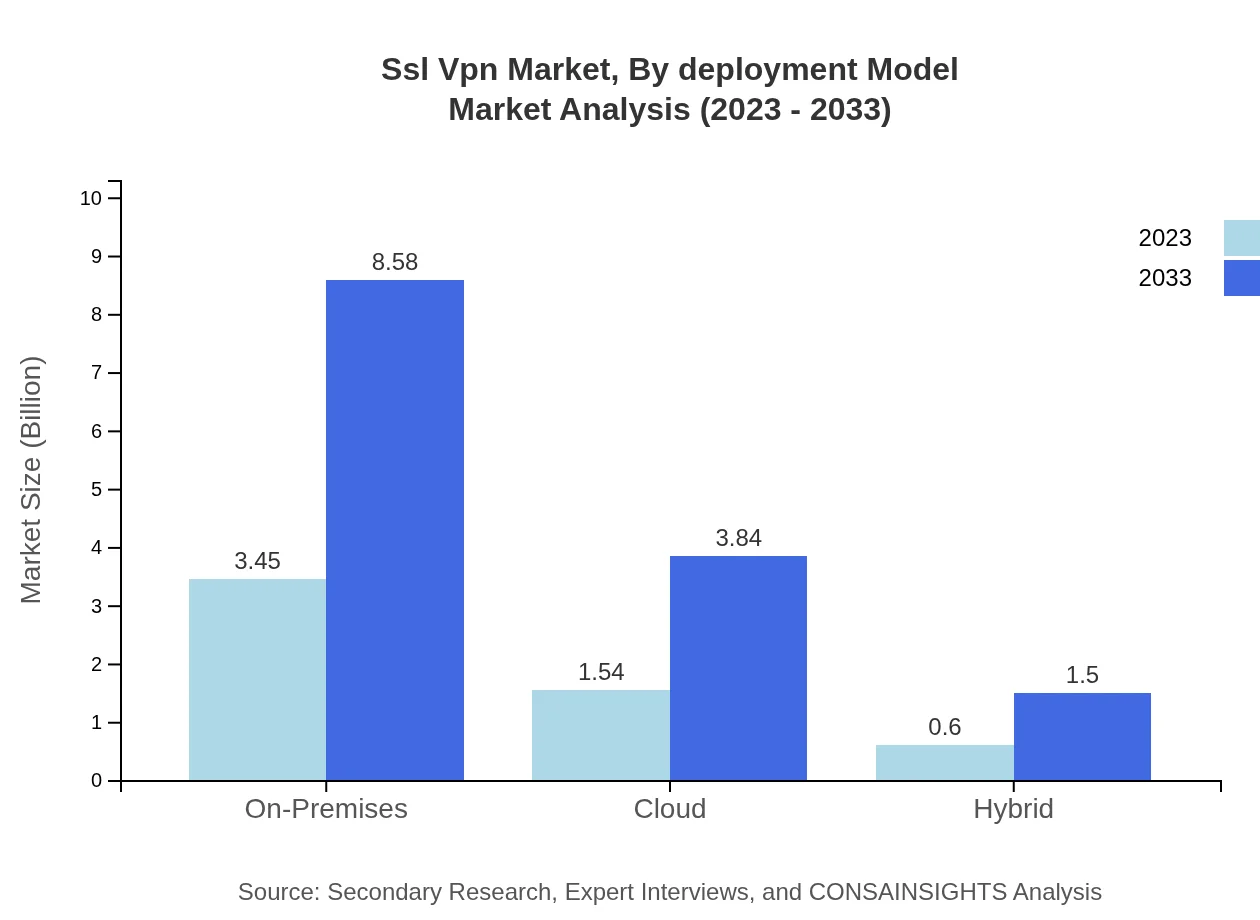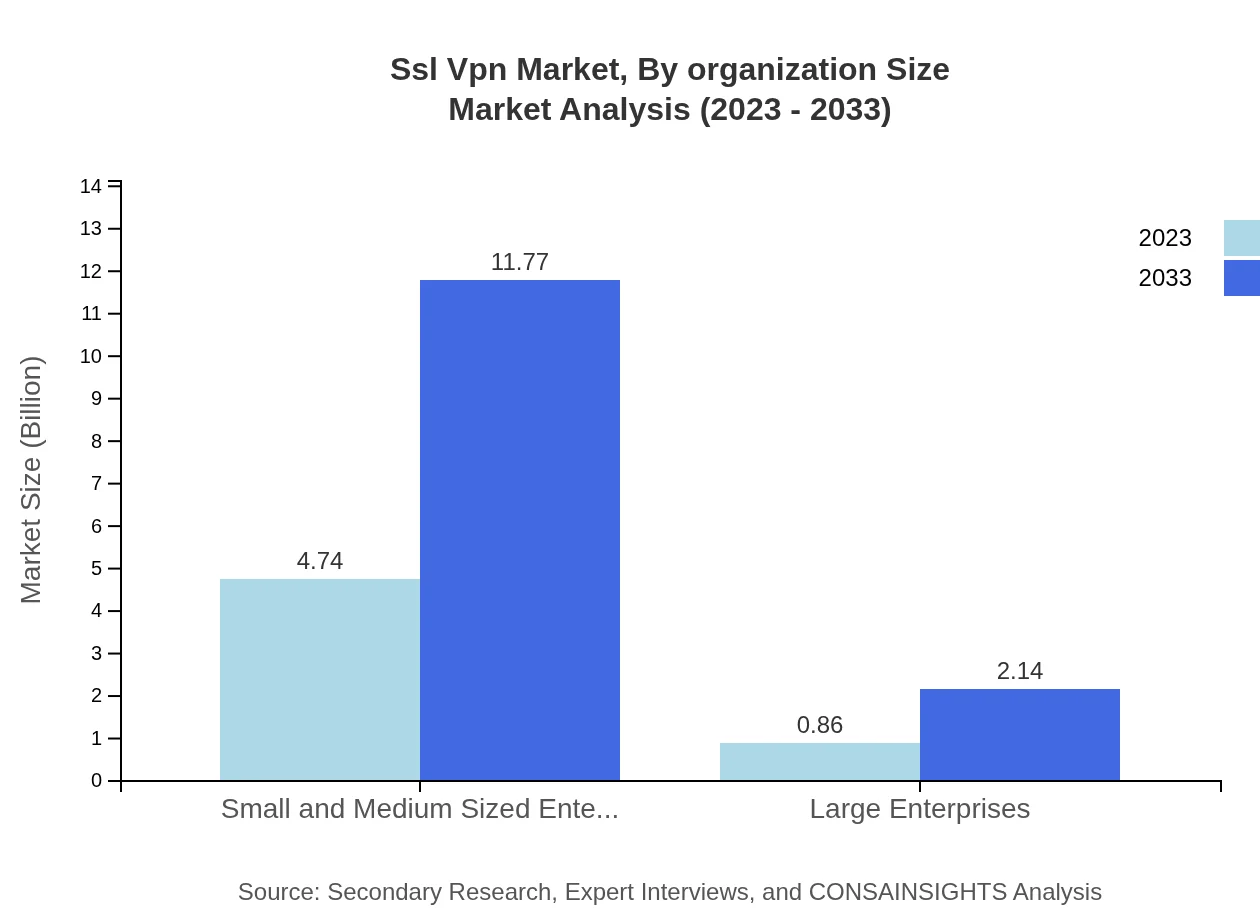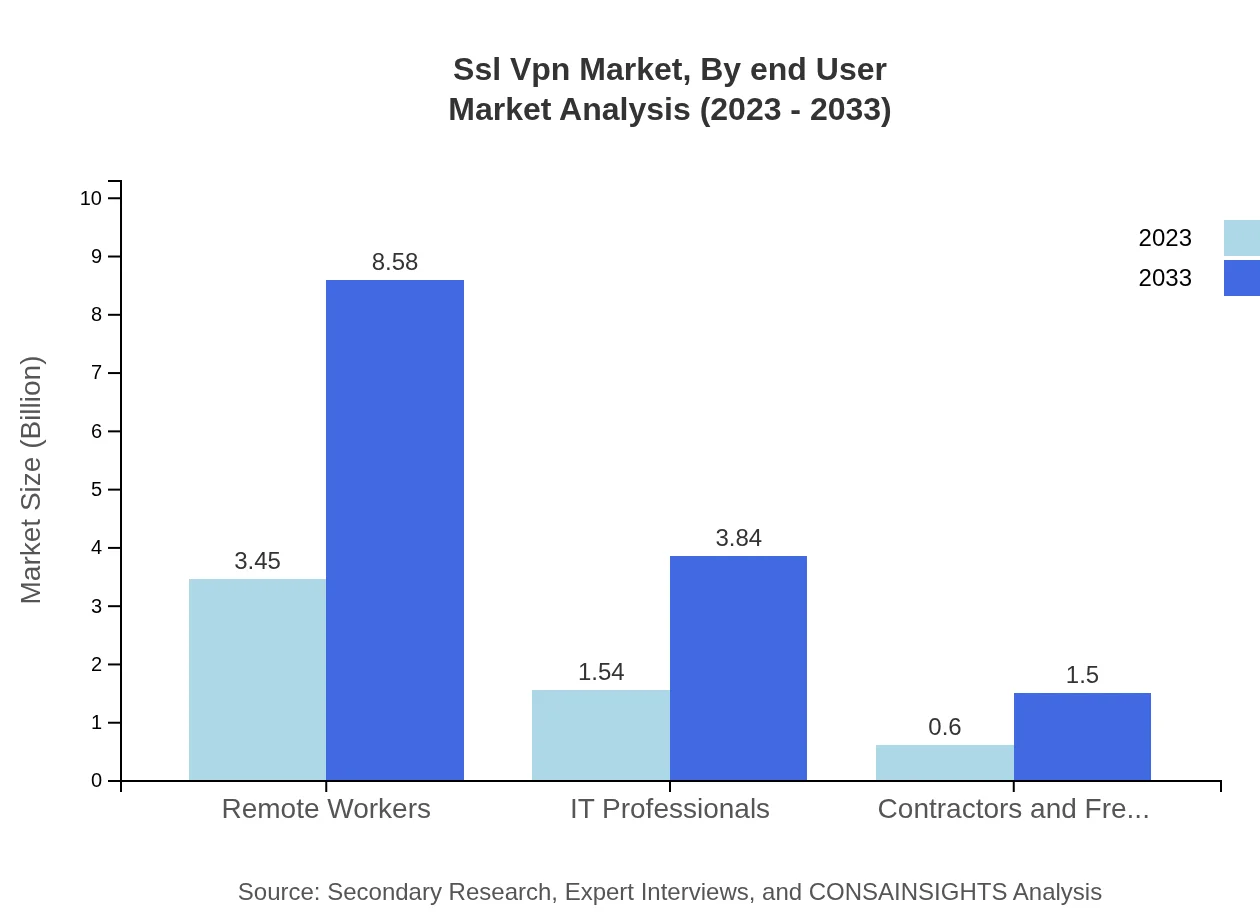Ssl Vpn Market Report
Published Date: 31 January 2026 | Report Code: ssl-vpn
Ssl Vpn Market Size, Share, Industry Trends and Forecast to 2033
This report provides a comprehensive analysis of the SSL VPN market from 2023 to 2033, delivering key insights on market size, growth trends, segmentation, and competitive analysis to help stakeholders strategize effectively.
| Metric | Value |
|---|---|
| Study Period | 2023 - 2033 |
| 2023 Market Size | $5.60 Billion |
| CAGR (2023-2033) | 9.2% |
| 2033 Market Size | $13.91 Billion |
| Top Companies | Cisco Systems, Inc., Palo Alto Networks, Inc., Fortinet, Inc., Check Point Software Technologies Ltd., Citrix Systems, Inc. |
| Last Modified Date | 31 January 2026 |
Ssl Vpn Market Overview
Customize Ssl Vpn Market Report market research report
- ✔ Get in-depth analysis of Ssl Vpn market size, growth, and forecasts.
- ✔ Understand Ssl Vpn's regional dynamics and industry-specific trends.
- ✔ Identify potential applications, end-user demand, and growth segments in Ssl Vpn
What is the Market Size & CAGR of the Ssl Vpn market in 2023?
Ssl Vpn Industry Analysis
Ssl Vpn Market Segmentation and Scope
Tell us your focus area and get a customized research report.
Ssl Vpn Market Analysis Report by Region
Europe Ssl Vpn Market Report:
Europe's SSL VPN market size is projected to grow from $1.36 billion in 2023 to $3.38 billion by 2033, driven by stringent data protection laws and increased awareness of cybersecurity risks among organizations. Legislative measures such as GDPR encourage businesses to invest in secure communication channels, fostering a robust market environment.Asia Pacific Ssl Vpn Market Report:
The Asia-Pacific region is poised for significant growth, with the market size expected to rise from $1.20 billion in 2023 to $2.98 billion by 2033. This growth is driven by rapid digital transformation initiatives and an increasing number of tech startups aimed at providing innovative solutions. High internet penetration rates and the burgeoning e-commerce sector also contribute to the heightened demand for secure remote access.North America Ssl Vpn Market Report:
North America holds a substantial share of the SSL VPN market, with expected growth from $1.98 billion in 2023 to $4.91 billion by 2033. The region's extensive IT infrastructure and the presence of numerous leading security solution providers facilitate aggressive market penetration. A strong focus on cybersecurity and compliance regulations further augments this demand.South America Ssl Vpn Market Report:
In South America, the SSL VPN market is expected to grow from $0.42 billion in 2023 to $1.04 billion by 2033. The region's growth is supported by increased investment in digital security by businesses looking to protect their data and ensure compliance with international standards. However, challenges such as infrastructure limitations may impact overall market growth.Middle East & Africa Ssl Vpn Market Report:
The Middle East and Africa are anticipated to witness a market size growth from $0.64 billion in 2023 to $1.60 billion by 2033, as organizations increasingly recognize the importance of cybersecurity in protecting sensitive data. The region's political and economic instability has heightened awareness around the need for secure remote access solutions.Tell us your focus area and get a customized research report.
Ssl Vpn Market Analysis By Product
The product segment analysis reveals that the software segment dominates the market, projected to grow from $3.45 billion in 2023 to $8.58 billion by 2033, owing to the increasing demand for scalable and user-friendly solutions. Hardware, while trailing, is also expected to see growth from $1.54 billion in 2023 to $3.84 billion by 2033. Services are expected to grow modestly, from $0.60 billion in 2023 to $1.50 billion by 2033.
Ssl Vpn Market Analysis By Industry
The SSL VPN market is significantly driven by key industries, with healthcare leading at $2.67 billion in 2023, forecasted to reach $6.64 billion by 2033, due to stringent data protection needs. Financial services also demonstrate strong growth from $1.24 billion in 2023 to $3.09 billion by 2033. Other notable industries include government and education, each maintaining a consistent contribution to overall market size.
Ssl Vpn Market Analysis By Deployment Model
On-premises solutions remain the preferred choice in the SSL VPN market, accounting for $3.45 billion in 2023, expected to grow to $8.58 billion by 2033. Cloud deployment is rapidly gaining traction, projected to increase from $1.54 billion in 2023 to $3.84 billion by 2033, reflecting growing familiarity with the SaaS model. Hybrid models, although currently smaller at $0.60 billion, are also anticipated to grow significantly.
Ssl Vpn Market Analysis By Organization Size
Small and medium-sized enterprises (SMEs) dominate the SSL VPN market, achieving a size of $4.74 billion in 2023, forecasted to rise to $11.77 billion by 2033. Their affordability and ease of deployment make these solutions attractive. Conversely, large enterprises, while spending more per solution, are expected to grow from $0.86 billion to $2.14 billion over the same period.
Ssl Vpn Market Analysis By End User
The end-user segment indicates that remote workers account for 61.68% share of the market, showing stability as they increasingly rely on SSL VPNs for secure access. IT professionals follow closely, demonstrating a significant reliance on these technologies for secure management. Contractors and freelancers also contribute to the market, driven by growing gig economy trends, while sectors like healthcare and finance showcase a high demand for enhanced security measures.
Ssl Vpn Market Trends and Future Forecast
Tell us your focus area and get a customized research report.
Global Market Leaders and Top Companies in SSL Vpn Industry
Cisco Systems, Inc.:
Cisco is a market leader known for developing advanced network security solutions, including SSL VPNs. Their products focus on providing seamless connectivity and robust security features, appealing to both large enterprises and SMEs.Palo Alto Networks, Inc.:
Palo Alto Networks offers next-generation security solutions that protect critical infrastructure through their SSL VPN offerings. Their focus on advanced security protocols makes them a preferred choice among enterprises.Fortinet, Inc.:
Fortinet specializes in cybersecurity solutions, including high-performance SSL VPNs, known for their scalability and reliability, catering to businesses of all sizes.Check Point Software Technologies Ltd.:
Check Point is recognized for its comprehensive security architecture, which includes secure SSL VPN connections that protect sensitive data across various sectors.Citrix Systems, Inc.:
Citrix is a leading provider of virtualization technologies, which includes SSL VPN solutions aimed at improving remote user experience while maintaining high security standards.We're grateful to work with incredible clients.









FAQs
What is the market size of SSL VPN?
The global SSL VPN market is valued at approximately $5.6 billion in 2023, with a projected CAGR of 9.2%. This growth is fueled by increasing remote work and demands for secure connections.
What are the key market players or companies in the SSL VPN industry?
Key players in the SSL VPN market include Cisco, Palo Alto Networks, and Fortinet. They lead in innovation and secure access technologies, catering to diverse industry needs.
What are the primary factors driving the growth in the SSL VPN industry?
Growth in the SSL VPN market is primarily driven by increasing cyber threats, a rise in remote work culture, and the need for enhanced data security across organizations.
Which region is the fastest Growing in the SSL VPN market?
The fastest-growing region in the SSL VPN market is Europe, projected to grow from $1.36 billion in 2023 to $3.38 billion by 2033, reflecting increasing cybersecurity measures.
Does ConsaInsights provide customized market report data for the SSL VPN industry?
Yes, ConsaInsights offers tailored market report data for the SSL VPN industry, ensuring clients receive insights specific to their needs and market scenarios.
What deliverables can I expect from this SSL VPN market research project?
Deliverables from the SSL VPN market research include detailed reports, market analysis, segment data, growth forecasts, and strategic recommendations personalized to client requirements.
What are the market trends of SSL VPN?
Current trends in the SSL VPN market include the shift toward cloud architectures, increasing reliance on remote services, and a growing emphasis on multi-factor authentication for enhanced security.


